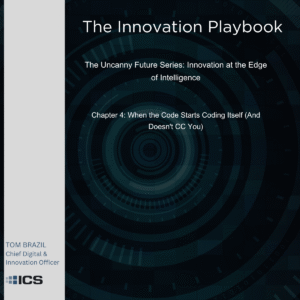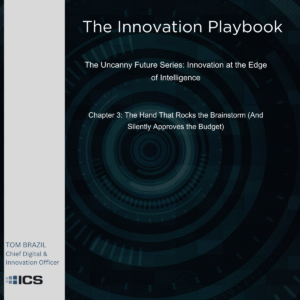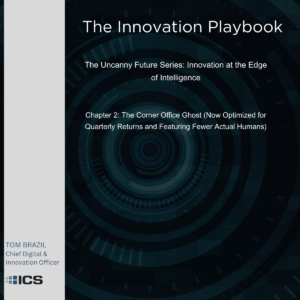I read a lot of articles about Operational Rigor delivering mission-critical IT support for the Department of Defense (DoD), and most of those discussions revolve around the latest technological innovations: impenetrable cybersecurity systems, meticulously designed redundancies, and cutting-edge automation tools. However, we’ve learned over 27 years supporting no-fail DoD missions that behind the scenes of every successful IT operation lies a factor that is all too often overlooked—the dedicated, highly skilled human workforce that forms the backbone of these complex systems.
While the advanced technology employed by the DoD and operated & supported by ICS plays a significant role in this success, we have found that it is a steadfast commitment to supporting and empowering our people that truly sets our teams apart.
This article delves into the human side of operational rigor, exploring the key lessons learned from ICS’s people-centric approach:
- Cultivating workforce resilience to thrive under pressure
- Developing rapid crisis response capabilities
- Implementing knowledge retention strategies for long-term continuity
- Investing in continuous learning and skill development
By looking at these key factors and how they affect ICS’s performance, we want to share the important role that people play in ensuring and maintaining high standards in critical IT environments.
Lesson 1: Cultivating Workforce Resilience
One of the most significant challenges faced by mission-critical IT teams is the constant pressure to perform in high-stakes, time-sensitive situations. With system uptimes of 99.99% required to support national security objectives, IT professionals must be prepared to make critical decisions rapidly and accurately, leaving no room for error. Moreover, these teams must maintain a state of constant readiness to respond to both cyber and operational contingencies at a moment’s notice.
To cultivate a workforce capable of thriving under such intense pressure, ICS has developed a comprehensive approach that focuses on two key areas: rigorous training and mental resilience.
Rigorous Training: ICS mandates that all team members obtain certifications such as Security+, CISSP, RMF, and Agile RMF. By equipping its workforce with a deep understanding of security principles and compliance frameworks, ICS ensures that its teams have the technical expertise necessary to navigate complex DoD IT environments with confidence. ICS University also provides thousands of online courses to help our people maintain a sharp edge on their skills as technology evolves. This is a big investment with huge rewards to the mission.
Mental Resilience Techniques: We’ve observed a huge cognitive toll that high-pressure environments can take on individuals. We’ve integrated cognitive load management strategies into our ICS Operating System (IOS) that all of our contractor teams run on. These techniques, which may include mindfulness practices, stress management techniques, clarity breaks, and regular check-ins, help team members prevent burnout and maintain the mental clarity needed for optimal decision-making.
The efficacy of ICS’s approach to building workforce resilience is borne out in our 95% employee retention rate. This metric underscores the value of investing in human capital and creating a supportive environment that enables individuals to thrive, even in the face of immense challenges.
Lesson 2: Developing Rapid Crisis Response Capabilities
While prevention is always the first line of defense, the true test of operational rigor lies in an organization’s ability to respond swiftly and effectively when crises do occur. In the context of mission-critical IT support, this means having the processes and capabilities in place to handle both cyber incidents and operational disruptions with minimal impact on overall mission continuity.
ICS has implemented a comprehensive Joint Incident Response Framework, aligned with CJCS Guide 3130 and DoD Cyber Incident Response guidelines. This framework encompasses several key components:
- Detailed Playbooks: ICS maintains a library of meticulously crafted incident response playbooks that provide step-by-step guidance for handling a wide range of potential scenarios. These playbooks ensure that teams can spring into action quickly and decisively, following pre-established protocols to minimize downtime and data loss.
- Crisis War Rooms: In the event of a major incident, ICS activates dedicated crisis war rooms where IT and cybersecurity experts can collaborate in real-time to assess the situation, coordinate response efforts, and deploy necessary countermeasures. By facilitating rapid information sharing and decision-making, these war rooms enable ICS to mount a swift and effective response to even the most complex threats.
- Readiness of Capability (ROC) Drills: To keep its incident response capabilities sharp, ICS regularly conducts ROC drills that simulate real-world attack scenarios. These immersive exercises provide invaluable opportunities for teams to hone their skills, test their readiness, and identify areas for improvement in a controlled environment.
True operational rigor isn’t just about preventing crises—it’s about responding to them with precision and speed when they inevitably arise. Our teams train continuously using our Joint Incident Response Framework to ensure that when disruptions occur, mission impact is minimized. Through these structured response protocols, we’ve demonstrated the ability to restore critical operations significantly faster than industry benchmarks, reinforcing the essential role of highly skilled personnel in maintaining mission resilience.
Lesson 3: Implementing Knowledge Retention Strategies
Another significant risk factor in mission-critical IT support is the potential for knowledge loss due to staff turnover. As skilled personnel transition out of roles, organizations may find themselves struggling to maintain the same level of expertise and performance, leading to a gradual erosion of operational rigor over time.
To mitigate this risk, ICS has implemented a multi-pronged approach to knowledge retention that leverages both human-centric processes and cutting-edge technology:
- Knowledge Transfer Playbooks: ICS requires every IT specialist to contribute to the creation and continuous updating of detailed knowledge transfer playbooks. These documents capture critical information about systems, processes, and best practices, ensuring that valuable institutional knowledge is preserved and easily accessible to new team members.
- AI-Driven Knowledge Management: To further enhance its knowledge retention capabilities, ICS has integrated AI Agents to permanently capture knowledge and make it available for search by anyone on the team. By automatically extracting and organizing key information from a variety of sources, these AI-powered systems help preserve crucial expertise and insights across long-term contracts, even as individual contributors come and go.
- Cross-Training and Redundancy Planning: ICS also employs a structured approach to cross-training and redundancy planning to ensure that no single point of failure exists within its mission-critical IT teams. By systematically rotating personnel through different roles and responsibilities, ICS helps distribute knowledge more evenly across the organization, reducing the impact of any individual departure.
The results of ICS’s knowledge retention efforts speak for themselves: by implementing these structured continuity protocols, we have achieved a 42% reduction in IT staff onboarding time and time-to-proficiency. This metric underscores the value of proactive knowledge management in maintaining operational resilience and seamless service delivery, even in the face of personnel changes.
Lesson 4: Investing in Continuous Learning
The ability to keep pace with technological advancements is essential for maintaining operational rigor. To ensure we stay abreast of technological advancements, we have made significant investments in continuous learning and skill development through its innovative ICS University program.
ICS University is a comprehensive training initiative designed to empower government programs by providing ICS employees with access to a wide range of learning opportunities at no cost to the government or our employees. Key features of the program include:
- Diverse Training Opportunities: ICS University offers over 16,000 on-demand courses covering a broad spectrum of critical IT career fields such as Systems Administration, Database Administration, and Help Desk operations, as well as soft skills training. This extensive library ensures that ICS team members have the resources they need to continually expand their knowledge and stay current with industry best practices.
- Up-to-Date Content: To keep pace with the rapid evolution of technology, ICS University regularly refreshes its course offerings to reflect the latest advancements and trends. By ensuring that its content remains aligned with the most current tools, techniques, and standards, ICS enables its workforce to maintain a state-of-the-art skill set.
- Employee Development: Beyond simply providing access to training resources, ICS University takes a proactive approach to employee development, working with team members to identify skill gaps and chart personalized learning paths. By continually enhancing the technical and operational capabilities of its workforce, ICS ensures that its teams are always prepared to meet and exceed customer expectations.
The benefits of ICS’s commitment to continuous learning extend far beyond the individual growth of its employees. For government customers, the ICS University program translates into:
- Enhanced Performance: With a workforce that is consistently trained to the highest standards, ICS is able to deliver top-quality service that meets or exceeds contract requirements, driving better outcomes for DoD missions.
- Increased Mission-Readiness: By proactively addressing skill gaps and keeping its teams at the forefront of industry knowledge, ICS ensures that its personnel are always ready to tackle new challenges and adapt to evolving mission requirements.
- Cost Efficiency: By providing comprehensive training in-house, ICS University helps government agencies avoid the expense of separate, externally funded training programs. This innovative approach allows DoD customers to benefit from a highly skilled workforce without incurring additional training costs.
As an integral component of ICS’s Proven Playbook and Proven Process, ICS University serves as a powerful example of how strategic investments in human capital can drive continuous improvement, enhance operational rigor, and deliver value to government customers.
Measuring the Impact of People-Centric Operational Rigor
While the qualitative benefits of a people-centric approach to operational rigor are clear, it is also important to consider the quantitative impact of these strategies. By tracking key performance indicators across its contracts, ICS has demonstrated the measurable value of prioritizing human capital in mission-critical IT environments.
- Incident Response Times: By empowering our teams with the skills, processes, and mental resilience needed to handle crises effectively, we have achieved significant reductions in the time required to identify, contain, and resolve incidents across all of our contracts. Faster response times directly translate into less downtime, fewer disruptions, and improved overall mission continuity.
- System Uptime: With a workforce that is prepared to anticipate, prevent, and rapidly respond to potential issues, our teams consistently achieve the exceptionally high levels of system availability that are essential for mission-critical DoD operations. By minimizing downtime and ensuring that critical systems remain accessible and functional, ICS’s people-centric approach directly contributes to the success of DoD missions.
- Customer Satisfaction: Our commitment to employee development and continuous improvement is reflected in the consistently high CPARS ratings of Very Good and Exceptional. By fostering a culture of excellence and empowering its workforce to deliver exceptional service, we have established ICS as a trusted partner to the DoD.
Take-Aways
It is easy to become enamored with the latest technological solutions and overlook the vital role that human capital plays in achieving and maintaining operational rigor. However, as the lessons learned from ICS’s people-centric approach demonstrate, true excellence in IT service delivery begins and ends with a focus on the workforce.
By prioritizing workforce resilience, investing in rapid crisis response capabilities, implementing effective knowledge retention strategies, and fostering a culture of continuous learning, ICS has built a foundation of operational rigor that consistently delivers results for its DoD customers. Our success serves as a powerful testament to the transformative impact that a commitment to human capital can have in even the most demanding and complex IT environments.
As DoD agencies and their industry partners continue to navigate the ever-evolving universe of mission-critical IT support, these lessons might serve as a valuable roadmap for putting people first. By recognizing and embracing the central role that human capital plays in driving operational rigor, organizations can position themselves to achieve new levels of performance, agility, and resilience in the face of any challenge.
Always More to Learn
I’d be interested in learning how your organization prioritizes human capital in its pursuit of operational rigor. What strategies have you found to be most effective in building and supporting a resilient workforce?







